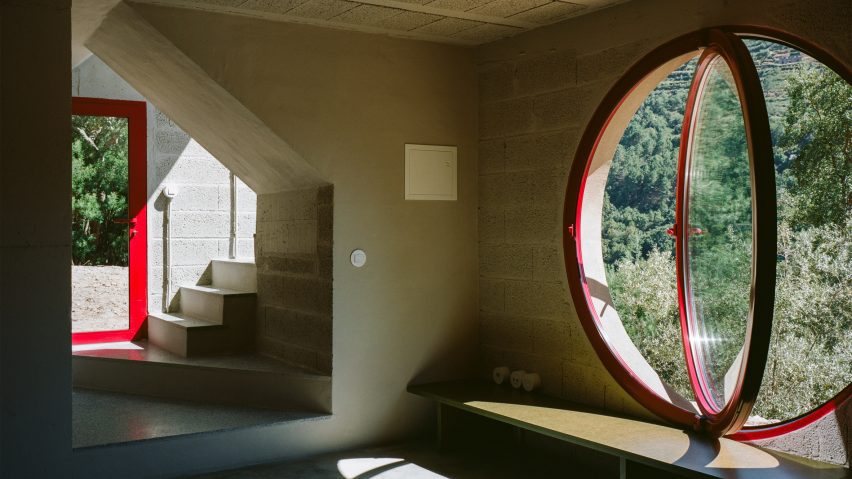Raw finishes and "as found" materials informed by brutalist architecture are used throughout this home, which Portuguese studio Atelier Local has created on a nature reserve near Porto.
Called House in Ancede, the house sits on the site of a former stone ruin that it was required to roughly match in terms of its footprint and volume.
A mismatch between the documentation of the site and the built reality allowed Atelier Local to expand the footprint of the building slightly, using the existing stones to rebuild retaining walls and make space for a bathroom and staircase.
"The house is a reconstruction of sorts," said the studio's co-founders Maria Rebelo and João Paupério. "Its proportions, the slope of the roof as well as the basis for the facade's composition was set from the beginning," they told Dezeen.
"In a way, we might say that the house was found as a ready-made and re-designed 'as found', to [refer] to Alison and Peter Smithson’s famous expression," they continued.
Stepping down the sloping site, the dwelling looks out towards a nearby woodland and the River Duoro through large rectangular and circular windows, with aluminium frames finished in a bright shade of red.
The living areas and bedrooms are organised across three floors, each finished with exposed materials and minimalist fittings. These were informed by descriptions of an old brutalist house belonging to the client's family.
"We've never actually been in this house and we've never even got to see proper images of it, but it has been described over and over again during the long discussions we had with the family," explained Rebelo and Paupério.
"Thus it began to build up in our imagination: a house where there were wide and narrow spaces, light and dark spaces, and they all seemed to be equally indispensable," they added. "Somehow, the project began and tried to reconstitute the seductive brutalism of this house."
The large openings face south, illuminating the staircase and a double-height living area, while to the west and east, smaller deep-set windows provide light to more private rooms.
While the concrete block construction is visible on the interior, it has been insulated and covered on the exterior with plaster in an ochre colour that matches the surrounding earth and the yellow shade of the existing granite walls.
Based in Valongo, Atelier Local was founded in 2019 by architects Paupério and Rebelo.
In nearby Porto, a similarly raw aesthetic was adopted by local studio Anarchlab, which designed a house covered in iron bars that will gradually be overgrown by plants.
Other recently completed Portuguese houses include an angular four-storey home formed of stacks of concrete and a green-tiled residence in Lisbon.
The photography is by Francisco Ascensão.
Project credits:
Architect: Atelier Local
Team: João Paupério, Maria Rebelo, Francisco Craveiro
Contractor: Varandas & Alpendres
Carpenter: Carpimestre
Engineer: FACE, lda

